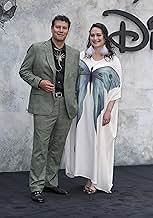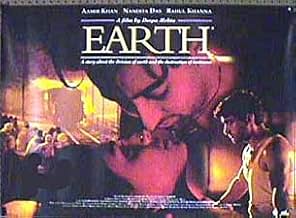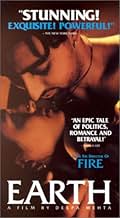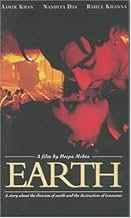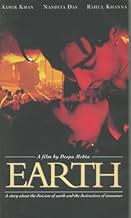Agrega una trama en tu idiomaIt's 1947 and the borderlines between India and Pakistan are being drawn. A young girl witnesses tragedy as her ayah (nanny) is caught between the love of two men and the rising tide of poli... Leer todoIt's 1947 and the borderlines between India and Pakistan are being drawn. A young girl witnesses tragedy as her ayah (nanny) is caught between the love of two men and the rising tide of political and religious violence.It's 1947 and the borderlines between India and Pakistan are being drawn. A young girl witnesses tragedy as her ayah (nanny) is caught between the love of two men and the rising tide of political and religious violence.
- Dirección
- Guionistas
- Elenco
- Premios
- 3 premios ganados y 2 nominaciones en total
- Hariya
- (as Raghuvir Yadav)
- …
- Butcher
- (as Pavan Malhotra)
- Dirección
- Guionistas
- Todo el elenco y el equipo
- Producción, taquilla y más en IMDbPro
Opiniones destacadas
I felt, this film mainly focuses on the character of Dil Navaz (brilliantly enacted by Aamir Khan) ... a person who turns from a cheerful, romantic and simple common man to a person who becomes violent and villanious in his hatred for a sect of people. The 1947 partition riots is an example of a social upheaval that can trigger such a change in a person. As the character says, we all have a lion encaged within us and the day the cage breaks open, God only can save us from the aftermath.
Aamir Khan is astonishing in his performance. He is gaining considerable mileage as a class actor ( a rarity in Hindi commercial film industry ) because of his recent pick of movies and definitely "Earth" marks a high point in his career graph. The different shades of emotion Dil Navaz undergoes through the film are effectively communicated through his face, articulation and body language. The climax scene is particularly memorable. Nandita Das and Rahul Khanna have given able support. The little girl Maia Sethna as "lenny" is also very promising. The direction has been very controlled and Deepa handles the events beautifully with excellent cinematographic support.
To sum it up, Earth offers an excellent viewing experience to all and makes the audience really "feel" for the victims ( both physical and mental ) of such events in World history as the India-Pakistan partition.
If the film is conventional is outline, it is also intelligent, beautiful and economical in a way most stodgy historical epics are not. Its predominantly Western structure is filtered through with a restrained Bollywood sensuality, and, in the first half especially, after one has gotten used to the rather stilted dialogue and stylised situations, one is astounded by the caressing fluidity of the camerawork; the uncommon beauty of compositions, especially indoors, where the essentially muted 'earth' colours of the decor are pierced by unearthly shards of light; the profusion of dazzling colours, in costumes, and especially in the horrific marriage sequence, undermining the strained sobriety of most historical epics; the unforced breaks into song and dance, the accumulation of vignettes, some comic, some full of joy and promise, some bursting with foreboding, that give a sense of life being lived, a life already fragile in status, waiting to be destroyed; the unabashed use of melodrama, its critical framing device (in one horrible scene, the protagonists watch helplessly from a balcony the strangely beautiful conflict, passive like us the audience), and its emotional demands on the audience I realise that much of my pleasure comes from a racist 'Orientalism', a projection of my desires of exoticism and Otherness on the East, but my own country has a traumatic history of British Imperialism and partitions, so I don't feel too guilty.
The first half is as good as anything in cinema this year, once one has got used to the shifts in register. It is full of the autumnal sadness of a Chekhov play, or Ray's CHARULATA, or LE REGLE DU JEU, where we observe people living life, being friends, making love playing games, while we know history is sadistically poised on the brink, waiting to crush everything. Mehta never falls into nostalgia for this doomed idyll - she records the legacy of the British Empire; the horrors of the caste system; the emotional repression, the arranged marriages between senile paedophiles and pre-pubescent girls. But this section is also full of epiphany, the thrill of the sexual chase, friendship, poetry and, above all, comedy, all the things about to be distorted and destroyed by history as it performs a body snatching operation onto people we have come to love and turns them into vicious murderers.
The second half is an unrelenting catalogue of jolting spasms of violence. Day gives way to night, earthy browns and sun to blackness, friendship and love to death and hate. The film is also a bildungsroman, the tale of the development of a young girl as she learns about life, love, family, gender, language, society, history, culture, politics a development cruelly cut short, distorted, vandalised - when we see the charming dew-eyed narrator half a century later, emotionally in ruins as she stands self-effacingly in the ruins of Imperial pomp (an amazing shot, the film's sparing use of ruined architecture gives the film on occasion a ghostly feel), we sense irreperable loss.
For me this movie is not about partition,but about human nature.The veil that separates us from animals becomes an anomaly in certain situation.So it is not so much the partition that drew the worst out of the characters but the demons such as lust,violence,jealousy,anger,resentment that already exist at the very core of human nature.It may or may not manifest itself in its most carnal form.But in this case it does.
The innovation of songs as a part of narration was a masterstroke and when you have A R Rehamn at the fore,there will be magic."Raat Ki Dal Dal" is probably one of the most wonderfully pictured songs I have have seen in recent times,as the camera zooms in on Aamir as he is waiting for the train from India,encapsulating his anxiety.The art work is accurate enough,the cinematography is excellent(notice how the camera-work changes from being still and peaceful in first half to more vibrant in the second half).
The performances of the entire cast is brilliant,whether it is the parsi family or Dil Nawaz's friend circle or even Gulshan Grover for that matter.Everyone seems to be on the money.Rahul khanna is a natural talent like his brother(which explains why he is not making it big in this superficial industry),he is rightly understated through the film.His is the only character which doesn't have as many demons and is probably at peace with himself after having the women of his dreams.Nandita Das is a brilliant actress whom I have long admired along with Seema Biswas and Konkana Sen.Her courage and talent shines through as she plays a character who is oozing sexuality,is flirtatious and maybe some what naive.
In case of great actors,I try not to use the "best" and "greatest" to describe their performances,because it in a way diminishes their remaining equally brilliant body of work.But this was a new high for Aamir khan in my book.Before this movie I thought he was one of the most talented,versatile and courageous actors within the industry.This film is where he transcended to greatness and stayed there.To be very honest,most of the ground work was laid in the novel for this role,but one needs great vision to convey this charming character's journey into madness.The use of body language and "silence" is what separates the great actors from others.Al Pacino,George C Scott,De Niro,Sanjeev Kumar understood the value of it and here Aamir showcases his class especially in the climax.
This film is not for the faint hearted.But that is what I have admired Deepa Mehta for.She has always been ruthlessly truthful when it comes to human nature whether it is "earth" or "fire".Unfortunately most of the Indians like the "escapist" mode just to "make them feel good about themselves".If you are one of those this not for you.
P.S.Majority of the reviews here are spot on and people not aware of the horrors of partition were also able to connect on a human level which fulfills the purpose of this film.
The film has at its heart the year 1947 when India was given its independence from Great Britain and at the same time bifurcated into two countries - India and Pakistan. The story opens with a tranquil park picnic in Lahore where friends - Hindu, Muslim, Sikh, Parsee - while away the afternoon in camaraderie. Only slight overtones of edgy topics about religion mar the conversation until the topic focuses on the incipient split of the country into two countries. Each of the friends represents each of the religious sects and it is how these differences, at once unimportant to friendship, end up in separating the friends under the influence of the devastation of bloodshed that follows the division of the country and the displacement of millions of people, all under the guise of independence.
There is a strong love story, a committed crippled child who experiences all of the happiness and subsequent tragedy that is to follow and the story ends with some words of wisdom by the grown little girl reflecting on choices made, and other sidebars that maintain interest at every frame.
The acting is first rate from a beautiful cast and Mehta's direction makes this tale of change whir by the viewer. For those not educated in the differences of the four religious sects of Hindu, Parsee, Muslim, and Sikh the tale can become confusing: would that Mehta would have included a discussion about the film in an added feature the way she helped us understand the plight of widows in WATER. And the subtitles unfortunately do not translate the English spoken portions of the film, portions that while very important to the story are nearly indecipherable due to the accents of the characters speaking.
But these are minor quibbles in a film that pleads for repeated viewings, so beautiful is the movie and so very important is the message. Highly Recommended.
¿Sabías que…?
- TriviaAamir Khan's first negative role. He went on to receive much critical acclaim for his performance.
- Citas
Older Lenny: I was eight years old, living in Lahore in March of 1947, when the British Empire in lndia started to collapse. Along with talks of lndia's independence from Britain came rumblings about its division into two countries, Pakistan and lndia. Hindus, Muslims, and Sikhs who had lived together as one entity for centuries. suddenly started to clamor for pieces of lndia for themselves. The arbitrary line of division the British would draw to carve up lndia in August of 1947 would scar the Subcontinent forever.
- ConexionesFeatured in Women Make Film: A New Road Movie Through Cinema (2018)
Selecciones populares
- How long is Earth?Con tecnología de Alexa
Detalles
Taquilla
- Total en EE. UU. y Canadá
- USD 424,798
- Fin de semana de estreno en EE. UU. y Canadá
- USD 42,449
- 12 sep 1999
- Total a nivel mundial
- USD 424,798


